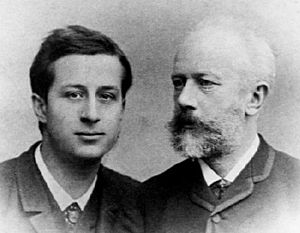Alexander Siloti facts for kids

Alexander Ilyich Siloti (also known as Ziloti) was a famous Russian pianist, conductor, and composer. He was born on October 9, 1863, and passed away on December 8, 1945.
His daughter, Kyriena Siloti, also became a well-known pianist and teacher. She taught in New York and Boston for many years.
Contents
Alexander Siloti's Early Life and Music Training
Alexander Siloti was born on his family's estate near Kharkiv, in what is now Ukraine. At that time, this area was part of the Russian Empire.
Studying at the Moscow Conservatory
Siloti began studying piano at the Moscow Conservatory when he was just eight years old, in 1871. His first teacher was Nikolai Zverev. Later, from 1875, he studied with Nikolai Rubinstein. Nikolai was the brother of the even more famous pianist, Anton Rubinstein.
During these years, Siloti also learned other important music skills. He studied counterpoint with Sergei Taneyev and harmony with Pyotr Ilyich Tchaikovsky. He also learned music theory from Nikolai Hubert. Siloti was a very talented student. He graduated in 1881 and won the Gold Medal in Piano.
Learning from Franz Liszt
After finishing his studies in Russia, Siloti traveled to Weimar, Germany. There, he continued to improve his piano skills with the legendary composer and pianist Franz Liszt. Siloti even helped start the Liszt-Verein in Leipzig. He performed his first professional concert on November 19, 1883.
Siloti's Career in Russia
Siloti returned to Russia in 1887. He became a teacher at the Moscow Conservatory, where he had once been a student.
Teaching and Editing Music
Some of his notable students included Alexander Goldenweiser and Leonid Maximov. His first cousin, Sergei Rachmaninoff, also studied with him. During this time, Siloti also started working as an editor for Tchaikovsky's music. He helped prepare Tchaikovsky's First and Second piano concertos for publication.
Siloti married Vera Tretyakova, who was also a pianist. Her father, Pavel Tretyakov, was a wealthy businessman and art collector.
Touring and Conducting
In May 1891, Siloti left his teaching job at the Conservatory. From 1892 to 1900, he traveled and performed across Europe with his family. He also toured cities in the United States, including New York City, Boston, Cincinnati, and Chicago in 1898.
As a conductor, Siloti led the very first performance of Rachmaninoff's Piano Concerto No. 2 in 1901. Rachmaninoff himself was the soloist. From 1901 to 1903, Siloti led the Moscow Philharmonic orchestra.
The Famous Siloti Concerts
From 1903 to 1917, Siloti organized, paid for, and conducted his own series of concerts in St. Petersburg. These "Siloti Concerts" were very important in the music world. He worked with the music critic Alexander Ossovsky to make them a success.
Many famous musicians performed at these concerts, such as Pablo Casals, Feodor Chaliapin, and Josef Hofmann. Siloti also introduced new music by composers like Debussy, Prokofiev, Stravinsky, and many others. The ballet producer Sergei Diaghilev first heard Stravinsky's music at one of these concerts.
Later Life and Legacy
Before 1917, Alexander Siloti was one of Russia's most important artists. Many composers, including Arensky, Liszt, Rachmaninoff, Stravinsky, and Tchaikovsky, dedicated their music to him.
Moving to America
In 1918, Siloti was put in charge of the Mariinsky Theatre. However, in late 1919, he left Soviet Russia and moved to England. He finally settled in New York City in December 1921.
From 1925 to 1942, Siloti taught at the Juilliard School, a famous music school. He also performed in concerts sometimes. In November 1930, he gave a memorable concert featuring only Liszt's music, with the famous conductor Arturo Toscanini. Many students learned from him, including Eugene Istomin.
Compositions and Transcriptions
Siloti was also very skilled at creating "transcriptions." These are arrangements of music written for one instrument or group of instruments, rewritten for another. He wrote over 200 such arrangements. He also created orchestral versions of music by Bach, Beethoven, Liszt, Tchaikovsky, and Vivaldi.
Perhaps his most famous transcription is the Prelude in B minor. This piece is based on a keyboard prelude by J. S. Bach. Siloti also made some piano recordings.
In 2014, the Alexander Siloti Archive was given to Stanford University. This collection includes his letters, documents, music, and manuscripts. These materials were used to write his biography, Lost in the Stars, and to publish a collection of his piano music.
Alexander Siloti is buried at the Russian Orthodox Convent Novo-Diveevo Cemetery in Nanuet, New York.
See also
 In Spanish: Aleksandr Ziloti para niños
In Spanish: Aleksandr Ziloti para niños
 | Jewel Prestage |
 | Ella Baker |
 | Fannie Lou Hamer |

